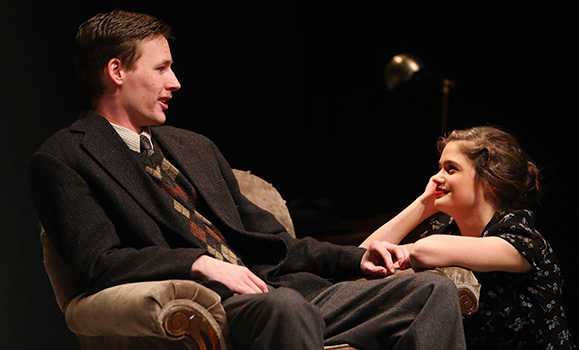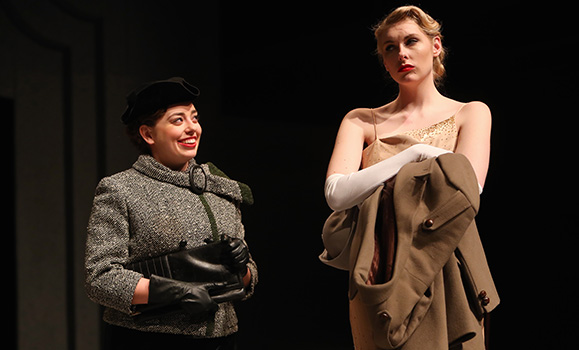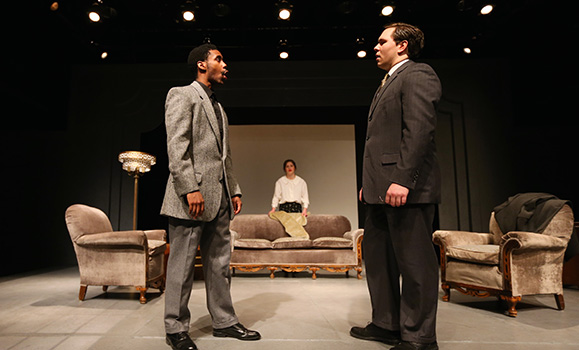ÔÇťEverything you say is absolutely sound and true, but you see, Mr. Kingsley, the trouble with me is ÔÇö IÔÇÖm stagestruck. The theatre beats me and starves me and forsakes me, but I love it.ÔÇŁ
╠ř
This is the passionate declaration of the vivacious, theatre-loving╠řactor╠řTerry, a character in George S. Kauffman and Edna Ferber's Stage Door. They're also words from the latest production from DalÔÇÖs Fountain School of Performing Arts, directed by faculty member Jure Gantar and featuring third-year acting students.
Terry is one of several actors living at Mrs. OrcuttÔÇÖs ÔÇťclub,ÔÇŁ a boarding house for actresses in New York City in the 1930s. The young women struggle to maintain personal and artistic integrity in the face of commercialization and the lure of fame and fortune Hollywood provides
Passions and pitfalls
Ursula Calder, who portrays Terry in FSPAÔÇÖs production, is thrilled to play a part that resonates so deeply with her.

Taylor McMillen and Ursula Calder.
ÔÇťI love her so much," says Calder. "She cares about theatre more than anyone else in the whole world. Acting is everything to her. [Her] love of theatre is the reason I wanted to play her so desperately. [...] IÔÇÖve never felt so close to a character before, actually. Ever. ItÔÇÖs a really, really cool thing.ÔÇŁ
However, the play also emphasizes the struggles of working in the theatre.
According to Dr. Gantar, the play is "about the position of theatre in contemporary society, specifically the position of actors when confronted with new media. I think it's about╠řhow hard the profession of an actor is, and even more, how hard it is for women."
Film, fame, fortune
Terry watches one of her friends, Jean, go to Hollywood and knows she canÔÇÖt make a similar choice.

Lindsey Ross and Meg Fenchak.
ÔÇťShe doesnÔÇÖt see film as real acting; itÔÇÖs a commercial thing to do,ÔÇŁ Calder says. ÔÇťItÔÇÖs there to entertain everyone. ItÔÇÖs not the passion, itÔÇÖs not the real ÔÇö itÔÇÖs not what acting is, in her mind, because you donÔÇÖt have to be a good actor to be in film. You just have to look good, and thatÔÇÖs not what she cares about, or what she wants to stand for.ÔÇŁ
Sophie Schade, playing another of the actors, Judith, observes something similar: ÔÇťFor [Judith], the most important part of where she is, is the friendships she has [...] and acting well, not just putting on a front ÔÇö which is why she talks about Jean not being a good actress, even though sheÔÇÖs so famous and her careerÔÇÖs doing so well: itÔÇÖs not real.ÔÇŁ
Although the play emphasizes the joys and energy of live theatre rather than cinema, lovers of film need not despair: ÔÇťWe love the film aspect, too,ÔÇŁ says Dr. Gantar.
This production bridges elements of theatre and film, at times through the use of technical elements such as cinematic, 1930s-style projections. It draws on tropes of the silent-film era, as well.

Delany McCormick and Jonah Campbell
As Schade says: ÔÇť[Jure] loves comedy, and so weÔÇÖve been trying to incorporate a lot of silent movie gags, or Charlie-Chaplin-style things, and so thereÔÇÖs a gag at the beginning of every act, which was either semi-written into the play already, or we put it in to add something or fill in something.ÔÇŁ
Aspiration with integrity
Lovers of 1930s film will recognize the showÔÇÖs fast-paced, witty dialogue, and conventional ÔÇťtypesÔÇŁ of characters, who are nonetheless imbued with humanity and realism. "We are trying to make the characters our own, as well," says Schade, in addition to drawing on these observable "types" in 1930s entertainment.
At its heart, the play is concerned with friendship, personal aspirations and integrity, and telling stories in an honest and unique way: aims that are common to both theatre and film.
Stage Door will be performed in the ║┌┴¤│ď╣¤═°Arts Centre's David Mack. Murray Studio Theatre, opening Tuesday, February 7th and closing on Saturday, February 11th. Performances take place peach evening at 7:30 p.m. with a 2 p.m. matinee on Saturday.╠ř For more information, visit the ║┌┴¤│ď╣¤═°Arts Centre Box Office.

